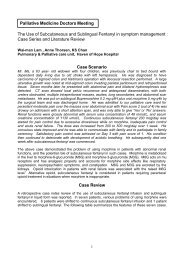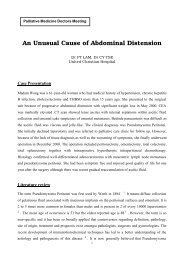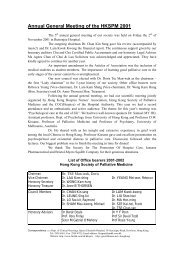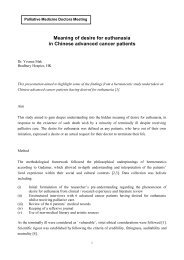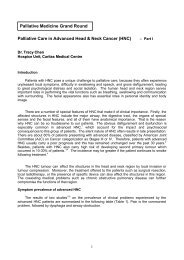Spiritual Care At The End Of Life - Hong Kong Society of Palliative ...
Spiritual Care At The End Of Life - Hong Kong Society of Palliative ...
Spiritual Care At The End Of Life - Hong Kong Society of Palliative ...
You also want an ePaper? Increase the reach of your titles
YUMPU automatically turns print PDFs into web optimized ePapers that Google loves.
HKSPM Newsletter<br />
One <strong>of</strong> the most significant spiritual sufferings<br />
at the end <strong>of</strong> life is existential suffering. Chochinov<br />
and his colleagues studied the notion <strong>of</strong> dying with<br />
dignity. <strong>The</strong>y developed a dignity-conserving<br />
model <strong>of</strong> end <strong>of</strong> life care including the issues <strong>of</strong><br />
hope, meaning, purpose and dignity, which could<br />
improve the quality <strong>of</strong> end <strong>of</strong> life care. <strong>The</strong>y found<br />
that, for many patients, maintained dignity was<br />
highly dependent on how they perceived<br />
themselves to be seen. <strong>The</strong>refore, supporting the<br />
perception that patients maintain their sense <strong>of</strong><br />
worth, as affirmed by those who care for them is a<br />
powerful dignity-conserving strategy. (Chochinov,<br />
2002) This is also a model in which the patient’s<br />
life history is concerned. <strong>The</strong> life story <strong>of</strong> a person<br />
is a good resource in initiating and providing<br />
spiritual care. <strong>The</strong> process <strong>of</strong> being listened,<br />
acknowledged, and remembered is a healing<br />
process that will help the patient to find the<br />
meaning <strong>of</strong> life, identity, and hope.<br />
Dr. William Breitbart, based on Viktor<br />
Frankl’s logotherapy developed a model <strong>of</strong><br />
‘meaning centered psychotherapy’. “According to<br />
logotherapy, the striving to find a meaning in one’s<br />
life is the primary motivational force in man.”<br />
(Frankl, 1939) Breitbart started his study with a<br />
psychotherapy group, which was “designed to help<br />
patients with advanced cancer to sustain or<br />
enhance a sense <strong>of</strong> meaning, peace and purpose<br />
in their lives even as they approach the end <strong>of</strong> life.”<br />
(Breitbart, 2002) After an eight-week course, the<br />
participants who had completed this course found<br />
that they had a more pr<strong>of</strong>ound way <strong>of</strong> thinking<br />
about their lives and their mortality. <strong>The</strong>y also<br />
found that the connectedness with others or<br />
something greater than themselves was important.<br />
<strong>The</strong>refore, meaning <strong>of</strong> life as a spiritual issue is a<br />
factor that gives strength in suffering. It is like a<br />
mother who can bear the suffering in giving birth to<br />
a baby because it is meaningful to her.<br />
Kaye Herth in his study, defined Hope as “an<br />
inner power directed towards a new awareness<br />
and enrichment <strong>of</strong> ‘being’ rather than ‘rational<br />
expectations" (Herth, 1990). In his study <strong>of</strong><br />
“fostering hope in terminally-ill people” Herth found<br />
that the presence <strong>of</strong> active spiritual beliefs and<br />
spiritual practices are important sources <strong>of</strong> hope.<br />
“<strong>The</strong> patient noted that their spiritual faith provided<br />
a sense <strong>of</strong> meaning for their suffering that<br />
transcended human explanations and fostered<br />
their hopes.” (Herth, 1990) <strong>The</strong>refore, hope is an<br />
important element at the end <strong>of</strong> life. Hope gives<br />
strength for enduring suffering. For the suffering is<br />
not everlasting and by expecting a positive future<br />
ahead, people can stand better against the<br />
suffering.<br />
<strong>Spiritual</strong> <strong>Care</strong> And Hospital Chaplaincy Service<br />
With Cases Sharing From Haven <strong>of</strong> Hope Hospital<br />
In some countries with Christian inheritage,<br />
healthcare organizations are requested to have<br />
established guidelines in spiritual care tailored to<br />
meet the needs <strong>of</strong> the community (Scottish<br />
Executive 2002). <strong>The</strong> chaplaincy on clinical<br />
pastoral care services in <strong>Hong</strong> <strong>Kong</strong> has also<br />
developed very rapidly over the past decade.<br />
Most <strong>of</strong> the palliative care units now have support<br />
from in-house or visiting hospital chaplains who<br />
are an integral member <strong>of</strong> the clinical team. <strong>The</strong>ir<br />
valuable contributions in holistic care towards the<br />
end <strong>of</strong> life are being increasingly recognized.<br />
According to Judith Allen Shelly, “Christian<br />
spiritual care focuses on helping others to<br />
establish and maintain a dynamic personal<br />
relationship with God by grace through faith.”<br />
(Shelly, 2000) Gorman opined that “ <strong>Spiritual</strong> care<br />
in the critical environment is always patientcentered<br />
and works towards integration and<br />
peace making” (Gorman, 2002). Through their<br />
compassionate presence, empathy, listening,<br />
prayer, scripture, ritual, worship, hymns, and<br />
pastoral counseling, the spirit <strong>of</strong> the patient is<br />
nurtured. <strong>The</strong> presence <strong>of</strong> the chaplains or clinical<br />
pastoral care team facilitates the discussion and<br />
supportive intervention <strong>of</strong> spiritual issues such as<br />
meaning <strong>of</strong> life, life after death, interpersonal<br />
relationship, hope <strong>of</strong> the future, existential<br />
suffering, forgiveness and letting go the burden,<br />
religious rituals and burial ceremony etc which are<br />
especially important at end <strong>of</strong> life care. In Haven<br />
<strong>of</strong> Hope, we observed a “3Rs” phenomenon in our<br />
patients, which could contribute to a peaceful<br />
death. <strong>The</strong> “Rs” stand for (1) Reconciliation with<br />
self, (2) Reconciliation with significant others and<br />
(3) Reconciliation with Creator God” as illustrated<br />
by Figure I and the following cases sharing.<br />
Case 1: Letting go <strong>of</strong> the anger inside<br />
Mr. C, around 70 years old, was an aggressive<br />
and strong willed man. <strong>At</strong> the beginning <strong>of</strong> his<br />
admission, he was very quiet but angry inside.<br />
He did not show any interest in the chaplain’s<br />
visit. He was frequently upset with his physical<br />
state and medical treatment. He always<br />
complained about the “wrong treatment” he<br />
received in other hospitals. He had actually<br />
written a lot <strong>of</strong> complaining letters during the few<br />
past years before and was still emotionally<br />
submerged in his anger upon admission to the<br />
Hospice <strong>Care</strong> ward in Haven <strong>of</strong> Hope. During his<br />
hospital stay, the chaplain’s patient attitude,<br />
pleasant visit and persistent prayers gradually<br />
made an impression on him. One day, he paged<br />
the chaplain and wanted to know more about<br />
HKSPM Newsletter Mar 2004 Issue 1 : p 8



